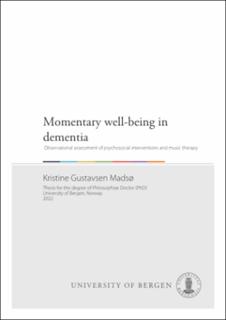| dc.contributor.author | Madsø, Kristine Gustavsen | |
| dc.date.accessioned | 2022-02-24T13:49:35Z | |
| dc.date.available | 2022-02-24T13:49:35Z | |
| dc.date.issued | 2022-03-04 | |
| dc.date.submitted | 2022-02-15T11:41:52.278Z | |
| dc.identifier | container/de/24/98/64/de249864-c53b-48e2-8741-3cc7732847e6 | |
| dc.identifier.isbn | 9788230855744 | |
| dc.identifier.isbn | 9788230843505 | |
| dc.identifier.uri | https://hdl.handle.net/11250/2981278 | |
| dc.description.abstract | Background: Dementia is an increasingly prevalent condition world-wide. A cure is yet to be found. The adverse behavioral and psychological symptoms accompanying dementia are best approached through non-pharmacological multi-component interventions. However, more than management of adverse symptoms is required to live well with dementia. Recent initiatives call for assessing interventions within the frame of positive psychology. People with dementia want interventions promoting well-being, facilitating continued relationship closeness, and supporting independency. Such outcomes guided the three research projects in this thesis.
Music therapy has so far demonstrated its potential as a beneficial approach for people living with dementia. Studies have primarily been conducted in long-term care and in populations with a severe dementia. However, most people with dementia live at home. A central aim of this thesis was to investigate music therapy for the home-dwelling population within a positive psychological framework, in particular assessing well-being and sociable interaction. Most dementias have a progressive course, which complicates a valid assessment of interventions over long time intervals. Assessment over short intervals in real-time appears advantageous to detect clinically important changes in well-being. This is possible through ecologic momentary assessment and observational methods. This thesis aimed to provide a systematic overview of available observational momentary well-being measures relevant for dementia research. No observational instruments were available for comparing well-being during music therapy and other interventions validly. Thus, the third aim of this thesis was to develop an instrument sensitive for detecting clinically significant changes in well-being over short time-lags, comparing music-therapy to other interventions.
Methods: Paper 1 is a systematic review of observational measures assessing well-being over small time-lags. The review is based on the Consensus based Standards for selection of health Measurement INstruments (COSMIN), assessing central measurement properties, feasibility, and interpretability. Paper 2 is a single-case study with a bi-phasic AB design replicated three times per participant. It included 11 participants and over 2000 observations. The study compared music therapy and regular social interaction for home-dwelling people with dementia and a close caregiver. The intervention was assessed with (1) observational measures investigating sociable interaction and well-being investigated in meta-analyses; (2) self-reported emotions for each session; (3) long-term well-being, neuropsychiatric symptoms, and caregiver burden before and after the 10-week intervention. Paper 3 describes the development of the Observed Well-being in Living with dementia Scale, an instrument assessing well-being during music therapy and social interaction. The instrument was developed through an iterative mixed methods approach including fieldwork, field-testing, psychometric properties assessment, focus group assessment from experts, and revisions and final field-testing.
Results: Paper 1 identified 22 instruments assessing well-being through observation. Content validity was the best documented measurement property. No instruments assessed responsiveness and very few assessed measurement invariance. Paper 2 found music therapy to promote individual well-being and sociable interactions towards significant others. Self-rated positive emotions were increased after the sessions. From pre- to post-sessions, neuropsychiatric symptoms were lowered. Long-term well-being and caregiver burden were stable. Paper 3 operationalized well-being as consisting of the eight items “attention”, “initiative/response”, “calm/relaxed”, “happiness”, “enjoyment”, “express identity”, “mastery”, and “relationship”. Content validity was adequate, reliability measures were good, and preliminary psychometric properties were promising.
Conclusion: This thesis adds to the current knowledge of well-being for people with dementia. It provides a structured evaluation of the current observational well-being instruments, their measurement properties, and their clinical utility. The intervention study found music therapy to have a potential to increase well-being and positive emotions in the moment and calls for replication. Additionally, the increase in sociable interaction can potentially facilitate relationship closeness. The observational instrument developed needs further assessment in larger samples and other contexts. | en_US |
| dc.language.iso | eng | en_US |
| dc.publisher | The University of Bergen | en_US |
| dc.relation.haspart | Paper 1: Madsø, K. G., Flo-Groeneboom, E., Pachana, N. A., & Nordhus, I. H. (2021). Assessing momentary well-being in people living with dementia: A systematic review of observational instruments. Frontiers in Psychology. 2021, 12, 742510. The article is available at: <a href="https://hdl.handle.net/11250/2834239" target="blank">https://hdl.handle.net/11250/2834239</a> | en_US |
| dc.relation.haspart | Paper 2: Madsø, K. G., Molde, H, Hynninen, K. M., & Nordhus, I. H. (2022). Observing music therapy in dementia: Repeated single-case studies assessing well-being and sociable interaction. Clinical Gerontologist. 2022, 45(4), 968-982. The article is available at: <a href="https://hdl.handle.net/11250/2976302" target="blank">https://hdl.handle.net/11250/2976302</a> | en_US |
| dc.relation.haspart | Paper 3: Madsø, K. G., Pachana, N., & Nordhus, I. H. Development of the Observable Well-being in Living with Dementia-Scale (OWLS): a measure for well-being during psychosocial and creative interventions. The article is not available in BORA. | en_US |
| dc.rights | Attribution-NonCommercial (CC BY-NC). This item's rights statement or license does not apply to the included articles in the thesis. | |
| dc.rights.uri | https://creativecommons.org/licenses/by-nc/4.0/ | |
| dc.title | Momentary well-being in dementia : Observational assessment of psychosocial interventions and music therapy | en_US |
| dc.type | Doctoral thesis | en_US |
| dc.date.updated | 2022-02-15T11:41:52.278Z | |
| dc.rights.holder | Copyright the Author. | en_US |
| dc.contributor.orcid | 0000-0002-4371-7576 | |
| dc.description.degree | Doktorgradsavhandling | |
| fs.unitcode | 17-34-0 | |

